Prior to having electricity at their rural health clinics in the Andean mountains, health care workers in Contumazá, Cajamarca, Peru had to travel three hours one way to obtain and deliver vaccinations, among many other critical setbacks. Peru also now has the fifth highest coronavirus caseload in the world at around 740,000 infected patients, and one of the world’s deadliest coronavirus fatality rates per capita. Quality medical services are needed now more than ever, particularly at remote clinics like these, which are playing a vital role as urban health centers often haven’t had the capacity to offer non-COVID-19 related, basic health services recently.
Fortunately, in early 2019, health care workers at health centers in the remote mountain communities of El Mote and Catuden expressed their concern to local officials about their inability to properly serve their patients due to a lack of electricity. In conjunction with their local governments, Green Empowerment, Practical Action Peru and Christadelphian Meal-a-Day of the Americas, these healthcare workers were able to have solar energy systems and solar water heaters installed to vastly improve the level and amount of services they can provide before the coronavirus outbreak began.
Lack of Electricity Deprives Remote Communities of Basic Health Services
Reliable and safe energy are critical to ensuring proper basic medical services, let alone withstanding a deadly pandemic. For around 2,900 people living in the communities of El Mote and Catuden, lack of electricity at medical centers was a fact of life that resulted in inefficiencies, delays, and sometimes foregoing treatment altogether.
When Paula Chavez, Head of El Mote Health Service, began working for the facility, she had to commute three hours from the city and then travel back and forth again to access and administer vaccines due to the facility’s lack of cold storage. “I had a challenge with the vaccines because I had to go up and down the same day and the kids were not vaccinated on time as a result,” Paula explained.
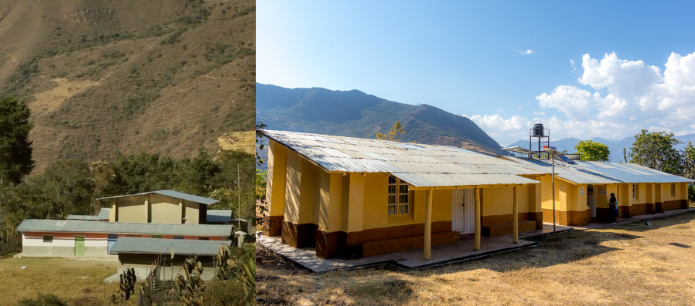
Health care workers in these remote regions were also not able to efficiently and properly keep track of patient information and medical histories because they didn’t have electricity to power a digital, easily accessible patient database. “We needed to go to the city to prepare our reports two days in advance,” explained Elizabeth Rodriguez, Head of Catuden Health Service.
What would be considered essential and rudimentary medical testing in other regions were impossible for health care workers to implement in Contumazá. Roiyer Vigo, a Nurse at Catuden Health Service, explained regarding hemoglobin tests, “We had to refer the patients and the children and take them to Chilete.” Chilete is about a two hour drive from the health clinics in rural Contumazá.
Health care workers at both Catuden Health Service and El Mote Health Service have been able to use hot water, as a result of their solar water heaters, in maternity treatment, to regularly disinfect their forceps, as well as to treat children with hypothermia.

Renewable Energy Improves Health Outcomes & Ensures Community Resilience
After holding numerous meetings with Ministry of Health officials, health care workers in Catuden and Mote were able to obtain two 400 watt solar energy systems, one per clinic, in 2019 with the support of Green Empowerment and local partner, Practical Action Peru. Each health center also received 120 liter passive solar water heaters. As a result of these installations, health care workers are now able to leverage technology to more efficiently administer vaccines, prevent childbirth complications, and ensure greater overall health for twelve surrounding communities – at any time, day or night.
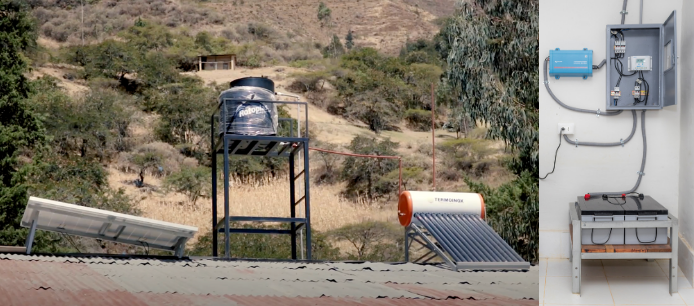
Patients no longer have to wait for, or forego receiving, basic vaccines such as flu, measles and Hepatitis B shots, which is particularly critical now when facing a deadly pandemic that has most dramatically impacted vulnerable populations. “We can keep the vaccines in our refrigerator now,” Paula Chavez, Head of El Mote Health Service explained. “The kids come and get vaccinated just on time when they have their follow up appointment,” she continued.
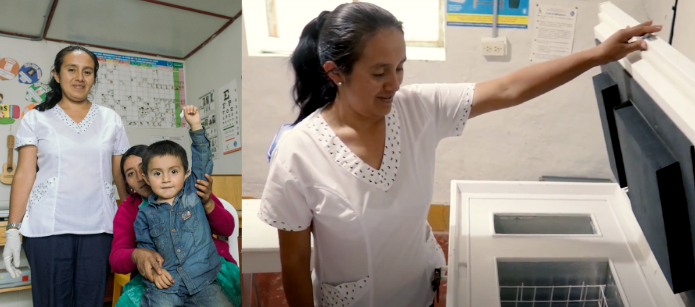
Thanks to reliable, twenty four seven energy access and thereby greater use of new medical equipment, women in these regions are now less likely to encounter complications during their pregnancies. “In the maternity unit, now with technology and thanks to the electric system installed, we can check the fetal heartbeat with the Doppler monitor,” Angelica Vargas, an Obstetrician at Catuden Health Service said. “The gooseneck lamp can also now be used to give us a better look at the cervix,” Angelica added.
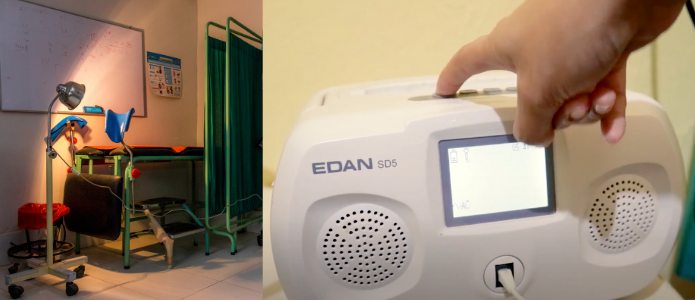
In addition to being able to now access new technology like cold storage and monitoring systems, these two health centers can now properly track patients’ medical histories electronically, which is essential to ensuring general health as well as preventing potential medical complications as a result of inaccurate information. “Using the computer helps us a lot, since we have a database where we enter information directly,” explained Roiyer Vigo, a nurse at Catuden Health Service.
“We don’t need to wait several days or go to the city anymore either,” Roiyer continued. In order to comply with government patient information-tracking requirements, health care workers in Contumazá used to have to regularly trek to the city to file hard copy patient documents with the government. They can now submit all information to the government through a software program installed on their computers, allowing them to now spend this additional time exclusively on patient care.
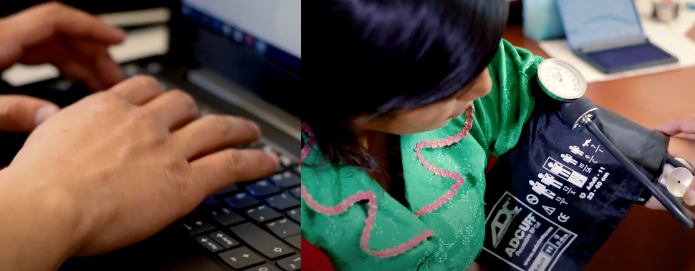
Training and Strong Local Partnerships Guarantee Long-Term Sustainability of Progress & Health Outcomes
In order to safeguard the long-term success of these projects, health care personnel and local leaders from the twelve communities served by the clinics requested and received robust training on each of the components installed. The trainings focused on system operation, maintenance, and troubleshooting for water heating, filters, and solar energy and battery storage systems. Community members also received training on newly accessible computer systems to further improve the efficiency of health care services and thus health outcomes for patients.
To ensure the sustainability of this work in the face of staff turnover, permanent personnel at each health clinic were appointed to transfer knowledge of system operation to new staff. Additionally, regular meetings, consultations, and field visits with personnel from the Ministry of Health have been critical to ensuring successful project results.
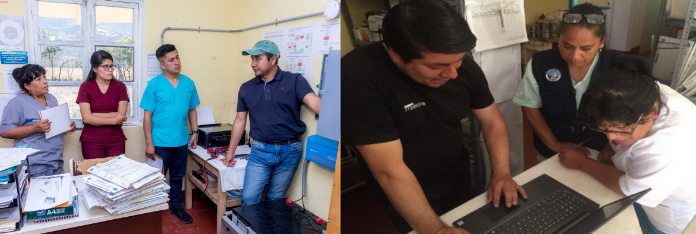
Replicating Successes Throughout Peru and Beyond
As a result of the improved health outcomes for these communities in Contumazá, Green Empowerment aims to promote the adoption of this model used for these health clinics throughout the country, particularly given the increased urgency in the face of COVID-19. Additionally, Green Empowerment will be replicating these projects, alongside local partners, through a pilot project in Uganda later this year to enable health clinics to better serve refugee populations. Green Empowerment envisions eventually expanding this model into more regions across the globe with the goal of strengthening medical services and increasing community resilience to diseases like COVID-19, particularly amongst the world’s most vulnerable populations, all while mitigating climate change.
